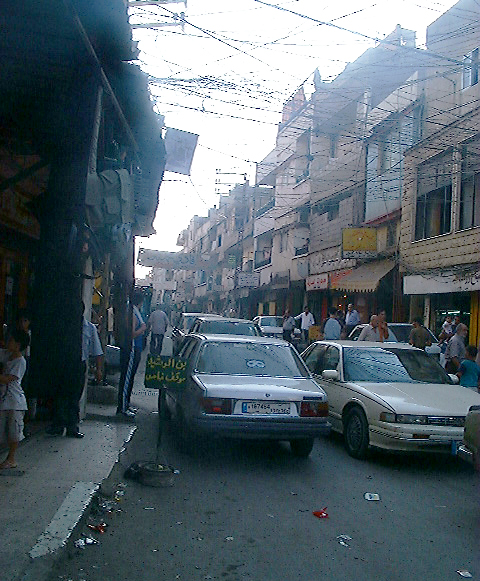|
Lebanese Special Operations Command
The Lebanese Special Operations Command (LSOCOM) ( ''Kiyadat al Kouwat al Khasa al Loubnanya'') is the unified combatant command charged with overseeing the various special warfare operations component commands of the Lebanese Armed Forces (LAF) which groups Lebanon's special combat units. The command is part of the LAF. Background The command was founded as a result of the lessons the Lebanese Army learned in the Nahr el Bared Operation. The Lebanese Special Forces spearheaded the attack on the camp in which 169 soldiers died and were the workhorse in the battle and the key to the success of the campaign. Nahr el Bared was the first occasion where these regiments were able to prove themselves capable, especially at anti-irregular military, counterterrorism, hostage rescue, and irregular warfare operations, which prompted the Lebanese Army Command to start planning to expand them. Structure The LSOCOM includes Lebanon's 4 Special Forces Regiments: * Counter-Sabotage (Moukafaha) ... [...More Info...] [...Related Items...] OR: [Wikipedia] [Google] [Baidu] |
Lebanon
Lebanon, officially the Republic of Lebanon, is a country in the Levant region of West Asia. Situated at the crossroads of the Mediterranean Basin and the Arabian Peninsula, it is bordered by Syria to the north and east, Israel to the south, and the Mediterranean Sea to the west; Cyprus lies a short distance from the coastline. Lebanon has a population of more than five million and an area of . Beirut is the country's capital and largest city. Human habitation in Lebanon dates to 5000 BC. From 3200 to 539 BC, it was part of Phoenicia, a maritime civilization that spanned the Mediterranean Basin. In 64 BC, the region became part of the Roman Empire and the subsequent Byzantine Empire. After the seventh century, it Muslim conquest of the Levant, came under the rule of different Islamic caliphates, including the Rashidun Caliphate, Rashidun, Umayyad Caliphate, Umayyad and Abbasid Caliphate, Abbasid. The 11th century saw the establishment of Christian Crusader states, which fell ... [...More Info...] [...Related Items...] OR: [Wikipedia] [Google] [Baidu] |
Lebanese Armed Forces
The Lebanese Armed Forces (LAF; ), also known as the Lebanese Army (), is the national military of the Republic of Lebanon. It consists of three branches, the ground forces, the air force, and the navy. The motto of the Lebanese Armed Forces is "Honor, Sacrifice, Loyalty" (). In politically unstable Lebanon, the Lebanese army has been described as one of the few state institutions in the country trusted by both the Lebanese population and the international community; and a guarantor of stability in multi-sectarian Lebanon. Emblem The Lebanese Armed Forces emblem consists of a Lebanon cedar tree surrounded by two laurel leaves, positioned above the symbols of the three branches: the ground forces represented by the two bayonets, the navy represented by an anchor, and the air force represented by two wings. General overview The Lebanese Armed Forces' primary missions include defending Lebanon and its citizens against external aggression, maintaining internal stability and secur ... [...More Info...] [...Related Items...] OR: [Wikipedia] [Google] [Baidu] |
2007 Lebanon Conflict
The 2007 Lebanon conflict began when fighting broke out between Fatah al-Islam, an Islamist militant organization, and the Lebanese Armed Forces (LAF) on May 20, 2007 in Nahr al-Bared, a UNRWA Palestinian refugee camp near Tripoli. It was the most severe internal fighting since Lebanon's 1975–90 civil war. The conflict revolved mostly around the siege of Nahr el-Bared, in addition to clashes that occurred in the Ain al-Hilweh refugee camp in southern Lebanon and other bombings that took place in and around the Lebanese capital, Beirut. Fighting ended in September 2007. Background Nahr al-Bared refugee camp Lebanon hosts more than 400,000 Palestinian refugees, some 215,000 of whom live in camps, including the descendants of those who fled from Palestine during the 1948 Arab-Israeli War. In 1962, Palestinians were categorized as foreigners in Lebanon, regardless of how long they had lived there. Non-Lebanese, which included the refugees, were restricted from working ... [...More Info...] [...Related Items...] OR: [Wikipedia] [Google] [Baidu] |
Lebanese Commando Regiment
The Commando Regiment () is a special forces unit in the Lebanese Armed Forces (LAF). History In 1960, General Emile Boustany, then the commander in northern Lebanon, and Mahmud Tay Abou Dargham discussed the creation of a commando unit. After Boustany became LAF commander, he ordered Captain Abou Dargham to train and form such a unit. The new unit was issued with reserve Beretta rifles. The first two-month course accepted 250 candidates, including Colonels Nabih Farhat and Makhoul Hakim who had attended Egypt's Commando School, of which 65 passed. A second course raised strength to 150. The Commando Company deployed to southern Lebanon during the Six-Day War. The unit was reduced in 1975 by the Lebanese Civil War, with members forming the core of new units, including the Al-Moukafaha. The commando unit received more attention when Abou Dargham became LAF chief-of-staff. According to Abou Dargham, the way that the commandos were trained, employed, and regarded changed in 1975. ... [...More Info...] [...Related Items...] OR: [Wikipedia] [Google] [Baidu] |
Marine Commandos
The Marine Commandos () are a special forces unit of the Lebanese Armed Forces (LAF). They are part of the Lebanese Special Operations Command (LSOCOM). Established with assistance from the United States Navy SEALs (U.S. Navy SEALs) and the British Royal Marines, Royal Marines Commandos, they are tasked with conducting a variety of missions, particularly in a maritime environment, which include: amphibious reconnaissance, anti-piracy, black operation, irregular warfare, ISTAR, maritime counter-sabotage, maritime counterterrorism and hostage rescue, naval boarding, naval special warfare, special operations behind enemy lines, and support maritime security. The Marine Commandos were established in 1997, then got their administrative independence in July 2001. History Until 1997, the only special forces in Lebanon was the Lebanese Commando Regiment, Commando Regiment. However, in 1997, as part of the reconstruction and the modernization of the Lebanese Armed Forces, the army comman ... [...More Info...] [...Related Items...] OR: [Wikipedia] [Google] [Baidu] |


